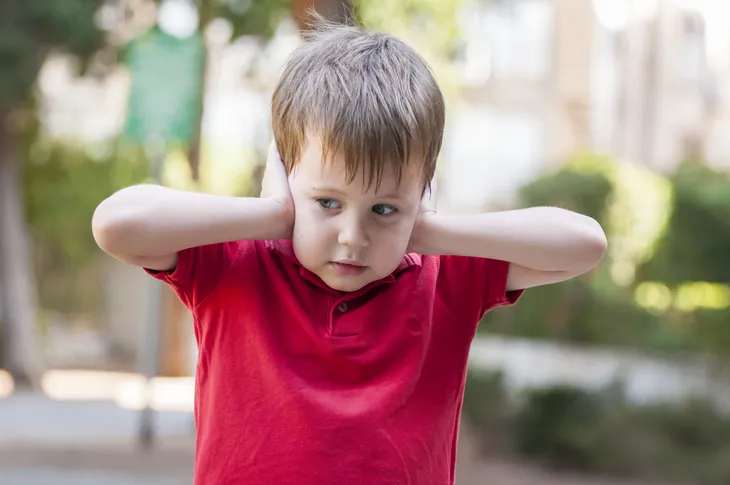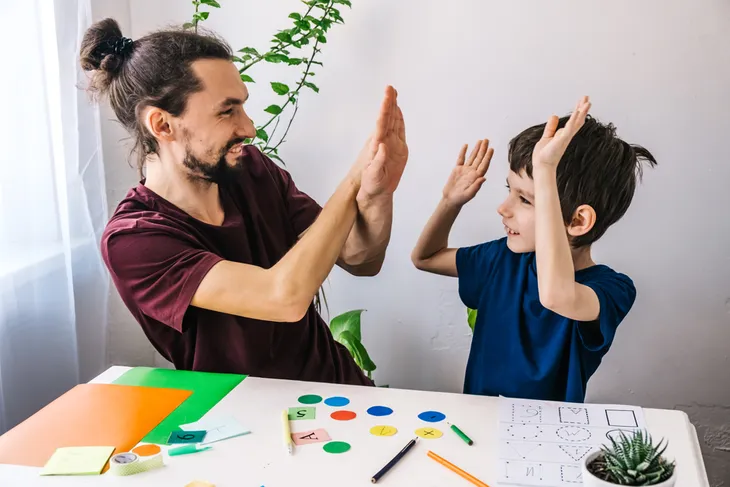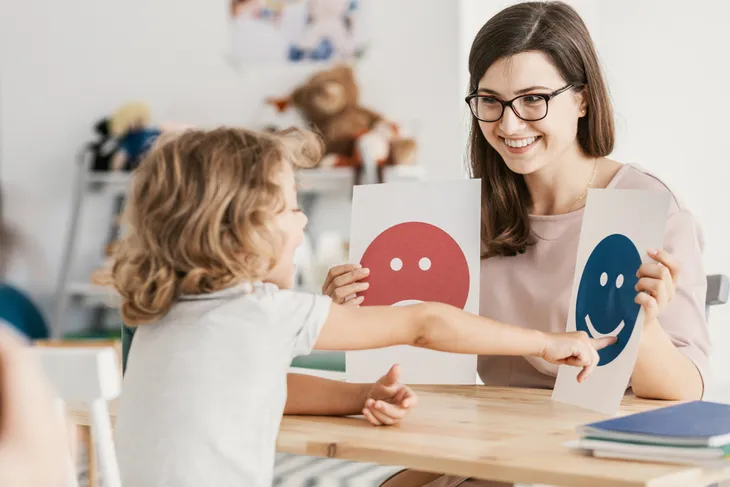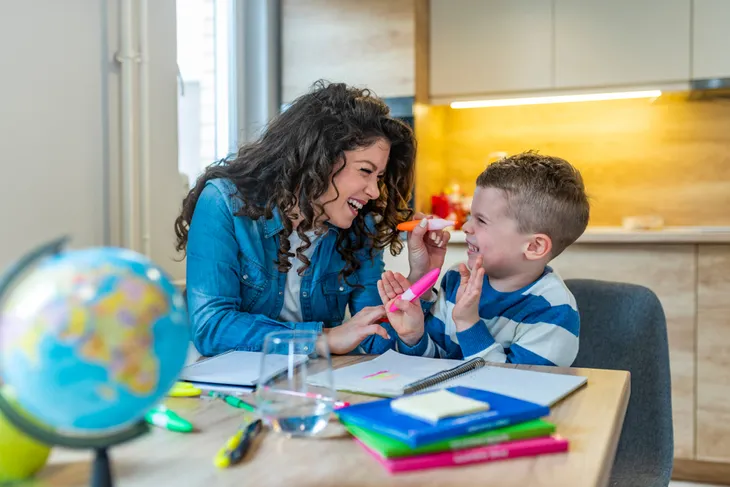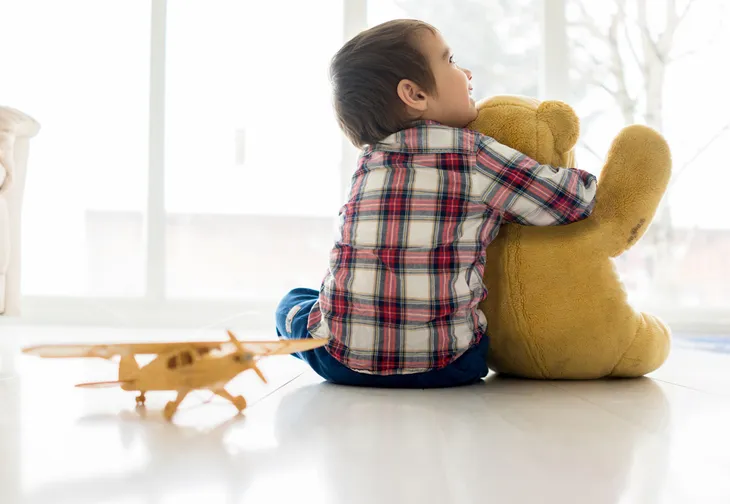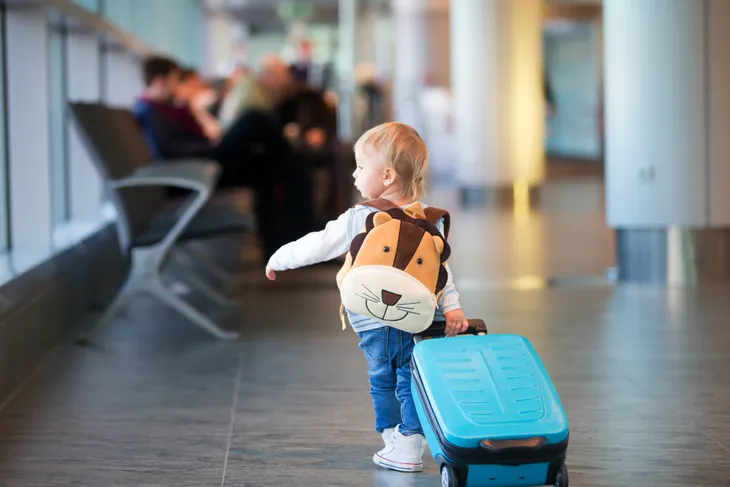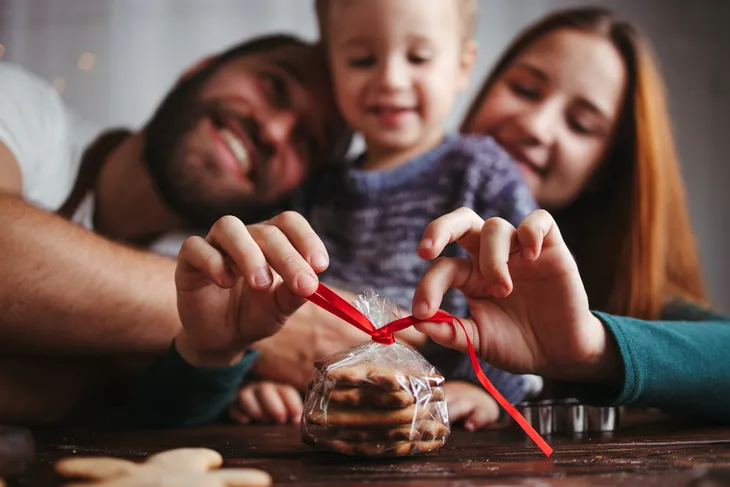- Though the holidays are meant to be bright and magical, they can be challenging for children and families with autism.
- To help you plan the holiday season, it’s important to know your child’s needs and limits.
- You can help your child prepare for the holidays with visual calendars, social stories, and role-playing.
Many people excitedly anticipate the holiday season. After all, there is a lot to look forward to from lavish holiday dinners, quality time with family, and new and old traditions. But individuals and families with autism spectrum disorder may find the holidays challenging to navigate. Obstacles like disrupted routines, large crowds, and other sensory sensitivities can be overwhelming and stressful.
But just because the holidays can be a challenge, doesn’t mean people with autism and their families can’t enjoy the season! It may just require some extra planning. Follow along as we look at how the holiday season may affect someone with autism plus tips to help you and your family have a happy and healthy season.
Why Can the Holidays Be Challenging for People With Autism?
Though the holidays are meant to be bright and magical, they can be challenging for children and families with autism. WebMD says noisy atmospheres, bright and flashing lights, and large crowds are just a few reasons why the holidays can be overwhelming.
The Organization for Autism Research (OAR) also notes that disrupted routines and expectations from family members who don’t understand autism can also make the season challenging and stressful. Here are 13 tips that may help!
Know Their Limits and Help Your Child Prepare for the Holidays
WebMD says it’s first vital to know your child’s limits. Can they handle noisy environments or activities? How will they deal with a disruption in their regular routine? Being familiar with their limits can help you prepare and know which aspects of the holidays you’re better off avoiding altogether.
After establishing your child’s needs and limits, the next step is to help them prepare. However, the Autism Society says it’s first important to determine how much preparation they need. Some children with autism may become anxious when anticipating an event, so the source says “you may want to adjust how many days in advance you prepare [them].”
One effective way to help your child prepare is to create a visual calendar that shows when the events are happening. Allowing your child to view the calendar daily and check off each day leading up to the event, can help them prepare for what’s to come.
Be Mindful of Decorations
A big part of the holidays is decorations both inside and outside the home. But it’s important to know that some decorations can be disruptive. Verywell Health suggests choosing sensory-friendly options like avoiding flashing lights.
WebMD also suggests decorating gradually instead of all at once. Introducing decorations in stages, such as putting up the Christmas tree one day and decorating it later, can help your child adjust to the change.
The Autism Society also says to take photos of your decorated home and put them in an album. The source says it may be helpful to revisit photos from previous holidays each year. Another effective way to help them transition is to involve them in picking out holiday decorations or setting up the decorations so “they are engaged in the process.”
How to Manage Sensory Challenges
Many children with autism spectrum disorder have sensory sensitivities. One way you can manage them is to avoid their sensory challenges, like taking your child to a busy shopping mall. Consider shopping online or asking someone else to pick the items up, or you could have someone take care of your child while you go shopping.
On the other hand, some children with autism can handle some crowds and noise but only for a limited time. In this case, Verywell Health says it’s important to have a plan b in place in case of sensory overload. For example, you may need to excuse yourself from the situation or WebMD says you can look for quiet spots. Check out the shopping center or party venue in advance and locate areas that are quiet. The source says if your child is feeling overwhelmed, you can take them to this calm, safe space to decompress.
Keep a Photo Album With Relatives on Hand
Quality family time is also a central focus around the holidays, especially with extended family you don’t see all the time. While this may be enjoyable for some people, unfamiliar faces can be overwhelming for children with autism.
The Autism Society says one way you can help your child prepare is by creating a photo album with relatives or other guests who will be visiting during the holidays. The source says to allow your child to view the photos regularly and go through the album with them. Talk about each family member so they can familiarize their faces with who they are.
Plan and Practice Special Events
Verywell Health suggests picking and choosing which events you attend during the holidays. Some disruption to their routine may be okay but the source says very few individuals with autism can handle complete disruption.
Before a special event, it may be helpful to practice what to expect. Using social stories with pictures and/or words is one way you can help them prepare. There are many free online resources you can use or you can create your own. Have your child explain the experience back to you so you know how much of the experience they understand. This can also help expose areas where your child still has questions or doesn’t fully understand.
Avoid Surprises
People with autism often struggle with disruptions in their routines. So, with this in mind, it’s best to avoid surprises as much as possible. Don’t rush your child out the door to go on a last-minute shopping venture, or to a party.
It’s vital to inform your child of your plans and help them prepare with visual calendars and social stories. It’s also important to try to stick to their routine as much as possible. WebMD explains that “maintaining your child’s usual breakfast and bedtime can give a sense of comfort during a busy holiday season.”
Don’t Be Afraid to Decline Invitations
Another helpful tip is don’t be afraid to decline invitations. While you may want to partake in every holiday party or event, sometimes you need to say “no,” especially if you know it will be too overwhelming for your child or family.
If you know a particular event will be too loud or disrupt their routine too much, then you may be better off not going. Alternatively, if you have a sitter that you regularly hire and is familiar with your child, you could ask them to stay home with your child while you go out. The bottom line goes back to knowing your child’s limitations.
Tips for Traveling During the Holidays
If you’re traveling for the holidays it’s also important to help your child prepare for long car rides or flights. Social stories and visual calendars can also help your child prepare for travel. If it’s your first time flying, you may want to visit the airport ahead of time to help familiarize the environment. On travel day, it’s important to inform the security officer of your child’s needs to help them get through security as smoothly as possible.
Packing their favorite foods and comfort items like toys or blankets can also help your child feel comfortable when traveling. It’s also important to bring your own necessities and don’t rely on others to have what you need. Entertainment devices like Ipads or tablets, reading books, and coloring books can also help.
Inform Your Family of the Expectations
While your immediate family may understand the needs and limitations of the person with autism, other family members, particularly extended family, may not. It’s important to inform your family of the expectations ahead of the holiday celebrations.
For example, the Autism Society says you may need to inform your family if your child with autism likes to be hugged, or if they need calm discussions. Perhaps there are discussion topics that are triggering and need to be avoided. If your child becomes upset, the source says it may also be helpful to “coach others to remain calm and neutral in an effort to minimize behavioral outbursts.” Think of any helpful tips to inform your family to help create a happy and comfortable holiday season for everyone.
 Shutterstock/fizkes
Shutterstock/fizkesTips for Gift Giving
Gift-giving occasions, like the holidays, aren’t always fun, especially for children with autism. Sometimes it can be stressful or scary, so if gifts are a part of your holiday you may need to help your child prepare. Steinberg Behavior Solutions says you can help your child prepare by creating a social story on the importance of giving during the holidays.
The source suggests creating a social story on why people give gifts and a story on manners. From there, you can help your child make a list of people they would like to buy or make gifts for. Involve them in the whole process, including gift wrapping. Then, you can also practice giving the gift. Consider role-playing with another sibling. The source says siblings can be great role models.
Tips for Receiving Gifts
Giving gifts is just one part, it’s also important to help your child prepare for receiving gifts. Steinberg Behavior Solutions suggests helping your child make a list of items they would like. If they’re too young, it may be helpful to walk them through a store to see what they’re interested in but explain ahead that you’re not buying gifts today.
To help them prepare you can practice unwrapping gifts. The source says if they become overwhelmed in this process, it may be best to ask the family to put the gift in a bag or leave it unwrapped. Practice manners too, and have your child say “thank you” when they receive a gift. If they’re nonverbal, the source suggests using thank you cards or having them point to a thank you icon.
In some cases, children with autism don’t want to participate in a gift-giving event and that is totally okay. Knowing your child’s limitations is key. Alternatively, the source suggests arranging gift time in increments, such as opening gifts with siblings one day and other family members another day.
Other Tips to Consider
While this list of tips just brushes the surface on ways to help your child navigate the holiday season, there are many other things to consider and ways you can help them cope. The Autism Society says it’s also important to keep your child’s dietary needs in mind. If they’re on a special diet or have certain restrictions, keeping food they can eat on hand during events can ensure your child has something to eat.
Verywell Health also suggests keeping the holidays simple and lowering your expectations can help both you and your child. Don’t be afraid to make your own traditions too. The source says children with autism love traditions too so create ones with your family that are easy and fun for everyone.
Don’t Forget to Take Care of Yourself
Verywell Health also points out it’s important that you don’t forget to take care of yourself. The holiday season is busy on its own but parents or caregivers often get so busy with tending to their child’s needs that they forget to take care of themselves. However, the source says, your child’s experience also depends “a great deal on your own feelings of calm and seasonal joy.”
You need to experience your favorite parts of the season too. Don’t be afraid to ask for help when you need it to ensure both you, your child, and your entire family can enjoy a healthy and happy season.

